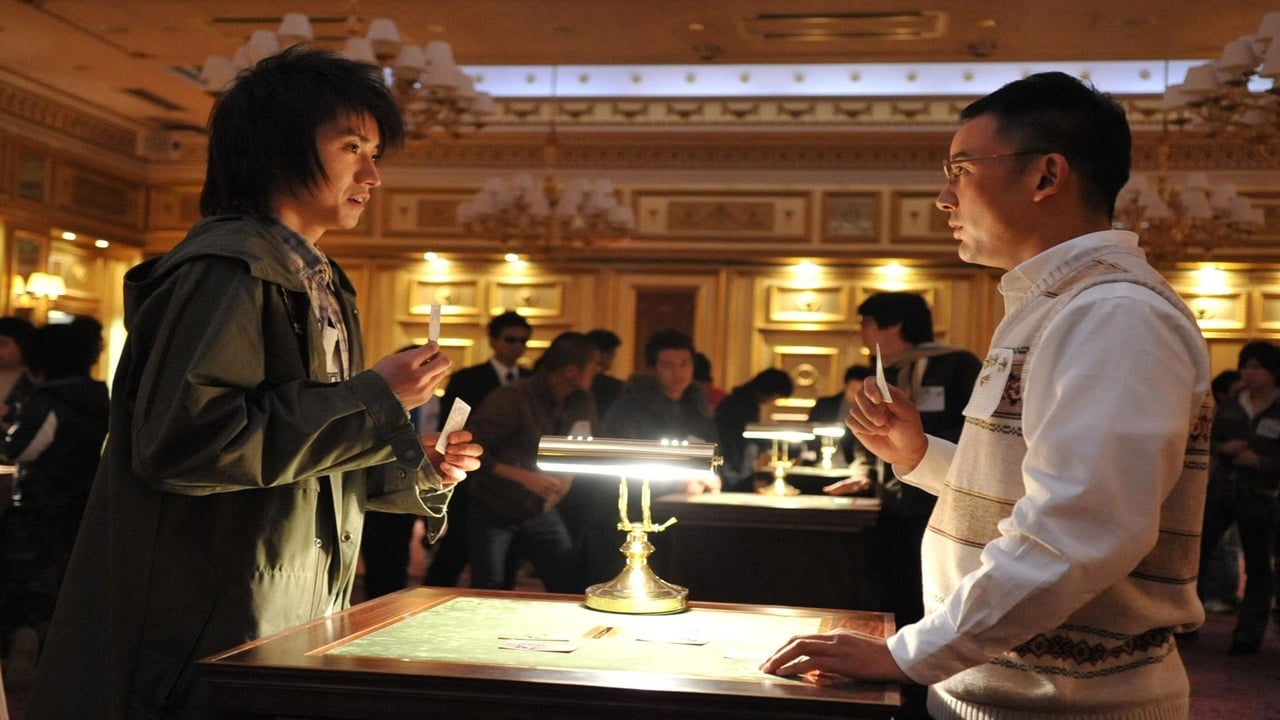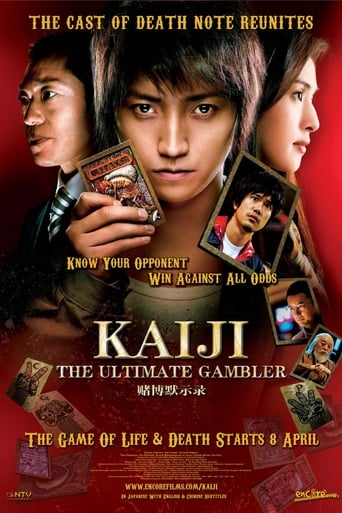

Perfect cast and a good story
... View MoreHow sad is this?
... View MoreGo in cold, and you're likely to emerge with your blood boiling. This has to be seen to be believed.
... View MoreJust intense enough to provide a much-needed diversion, just lightweight enough to make you forget about it soon after it’s over. It’s not exactly “good,” per se, but it does what it sets out to do in terms of putting us on edge, which makes it … successful?
... View MoreAlthough based on a manga from years ago the plot line of desperate debt-ridden men being exploited is very timely in today's economy. You certainly feel the film is trying to cram a lot into its plot - the underground society, the rich tyrant, the games, all feel like they were explored in greater depth in the manga. You certainly want to know more about the organisation running the games. The whole thing is absurd and not very believable but keeps you fascinated. The pacing is often all wrong, as the scene on the 'brave man road' and the end game is played for melodrama and takes too long as we watch characters emote for ages. Kaiji is the kind of hero you often get in Japanese films - a loser who gets a chance to find some backbone and determination while keeping to a moral code while others around him give in to temptation and fear. The twist ending is an amusing touch although you deal feel a little cheated after everything Kaiji has gone through, (though no doubt so does Kaiji himself). If this was a Western film Kaiji would have figured out some way to destroy the organisation, but perhaps like all of us little people, when it comes to the power of the rich and financial institutions, the best we can hope for is to get out free of debt, like Kaiji did...
... View MoreThis manga-to-screen adaptation by Toya Sato may have 'cult status' written all over it but only for its penchant to irritate and annoy viewers with all that sucks in terms of movie-making. Its sequences are all melodramatic - with the director trying to milk every scene for all the (fake) melodrama and bathos that it is worth.If there were a subtext or satire about how the dregs of Japanese society are caught in a self-imposed rut, it is overdone to the point of being ridiculous. However, if it is to reflect on the ridiculousness of Japanese TV game shows, it hits the nail on the head.The protagonist is Kaiji Ito (Tatsuya Fujiwara), a typical born-loser whose gambling habit lands him with a huge debt. His sins catch up with him when Rinko Endo (Yuki Amani) shows up with a list of his debts - and offers him a chance to repay them - by taking part in a winner-takes-all game on a darkened cruise ship. Those who lose the simple paper-scissors-stone game will end up working like slaves to build a ludicrous underground 'kingdom' planned by Endo's boss. Since every gambler is essentially a loser, Kaiji ends up in the slave detail. Still, since this is a gambling film, Kaiji gets a few more chances at getting out of his 'rut'.The main problem with this movie is that director Sato seems to be interpreting the manga comic for a bunch of morons instead of modern cinema audiences. Every aspect of the plot is over-explained and over-emphasised, stretching the film to an excruciating two-hour nightmare for viewers.Sato, a former TV director, allows Fujiwara to overact and over-talk like he is performing for a campfire. He prolongs every scene, especially the one involving the characters crossing a narrow beam suspended 200 metres above ground. There is nothing remotely realistic about the way the characters behave, especially at a time when their lives depended on it. There is no attempt made to provide backgrounds to Kaiji's character or any of the other cast members from the cult series Death Note. And if there are any funny moments, they are all unintended.Those who like to take a gamble on this movie may end up feeling like a loser, or worse, a sucker. - by LIM CHANG MOH (limchangmoh.blogspot.com)
... View MoreI know this about Japan, they take everything to the extreme, are a shame culture and are a very conservative people. For them the end goal in life is to get a job for a corporation and work for them forever.This movie does a pretty good job portraying this, as it is about an uneducated vandal who is working minimum wage at a convenience store. He messes with the wrong rich person, a yakuza, who ultimately brings up his past debt which is way more than he can afford. They give him the opportunity to go on a gambling boat to enter a high stakes competition with other "losers" to erase their debt if they win or face the perils of debt slavery.This movie touches on class struggle in a different way than most films. Even though they made the rich people to be bad guys they did touch on why some poor people seem to just be born to lose. What can i say it's the conservative nature of Japan haha it doesn't ever exonerate poor people. It is also a movie about game theory when it comes to the gamblimg games, which any gambler can enjoy.While the expressions and dialogue is kinda ridiculous, like when he's drinking beer/eating yakitori people got to remember this is an adaption from a manga/anime. To me that is the only negative as this is a pretty serious Manga, the Live Action version has unintentional funny moments with the ridiculous expressions.
... View MoreOut there somewhere, in a parallel universe, the rules of film-making are inverted.Rule number 1: You cannot have too much exposition.Visual storytelling is replaced by dialogue-heavy scenes, the more the better.Rule number 2: Over-acting is better than acting.If you are really thirsty and you drink a beer, you have to close your eyes, look to the heavens, ooh and ah, fall to your knees, and declare out loud how damn GOOD it tastes, all the while talking to yourself. You know, like in a beer commercial.The bad news is, director Toya Sato has escaped from that parallel universe into ours, and brought this clunking, tawdry, disjointed insult to the proud tradition of Japanese cinema with him.The story, such as it is, is that Kaiji has a huge gambling debt and his life is going nowhere. That leads him to becoming the plaything of a misanthropic multi-billionaire building a nuclear shelter using slave labour and with a penchant for life-and-death gambling games.Not a bad premise, but utterly sunk in this execution.If film is stories told by pictures, and the Japanese are a non-verbal culture, could someone please tell me why there is so much TALKING in this film? Kaiji crosses a narrow bridge 200 meters in the air. He looks behind to see that his friend has fallen. The audience can see he has fallen. But Kaiji tells us: "He has fallen." Endo watches a five-card game. The players play three cards, and each play is a draw. They have two cards left. We can see this, but somehow we get to hear Endo's thoughts, which tell us: "After three cards played it is a draw. It is down to the last two cards." Who exactly is this insipid narration for? Is there a retarded baboon wearing earplugs and a blindfold sitting at the back of the theatre that Sato felt the need to accommodate? I have given only two examples, but the whole film is like this. The most glaringly obvious action is either replayed, or explained verbosely by one character to another.Characterization is practically non-existent. Kaiji is a gambler, but where he came from, how he ended up in such a rut, is never mentioned. He empathises with one of his fellow victims, but it is not clear why. At his ostensible moment of triumph, he is celebrating gambling wins and downing a beer - despite the horror of watching all of his comrades in arms falling from the aforementioned narrow bridge. He starts the movie caring only for himself, and finishes it the same way. And we know no more about him.Endo is a gangster but seems taken by Kaiji, even though she is fully complicit in the murder and mayhem games that afflict him. It turns out she is no good, and this puts a period on the film's major failing - there is no one to like. All of the characters start out as reprehensible, and never redeem themselves. They never grow, learn, or reflect.Plotting is flimsy. Kaiji at one point conveniently produces a magic marker to draw with, despite just being released from a dungeon. The dungeon prisoners suddenly get a TV in their cell where no one existed before. At one point, on a ship, a left-over card in the game seals Kaiji's fate. It is a huge moment story-wise, propelling us into the next sequence. But as the game starts with an even number of cards and they are discarded two at a time, it is impossible for there to be one left-over card. Lazy, ill-disciplined scripting at its worst.Pacing is uneven to say the least. The bridge crossing takes an eternity, as Kaiji and his older pal have a sentimental outpouring about their lives so far. Any yet when we come back to the job at hand - crossing the bridge - we find out that the guy on the other bridge has made no progress during the course of the interminable conversation. I mean, what was he doing all this time? Tatsuya Fujiwara overacts furiously. His beer-drinking antics are just shameful, the worst hamming since... well, since the last TV director was allowed to make a Japanese film. Amami is usually classy, but even she can't get out of TV mode and comes across as wooden. Ken'ichi Matsuyama makes a cameo, and seems a class apart, making effective use of that menacing stare of his. Probably because he appears less, he took less direction from Sato, and therefore acts better.Teruyuki Kagawa, usually so reliable and watchable, is dragged under by too-close close-ups, patchy pacing, and the failure to resist cranking it up a couple of notches. A better director would have gotten a better performance, one feels.It is incredulous that with this budget and this cast Kaiji turns out to be so mind-numbingly awful. Based on a comic, with a TV director, didn't someone realise that the element 'cinema' needed to be added to the equation? Sato and friends - go to film school, and learn the basics. Please. Or at least go back to your parallel universe.
... View More